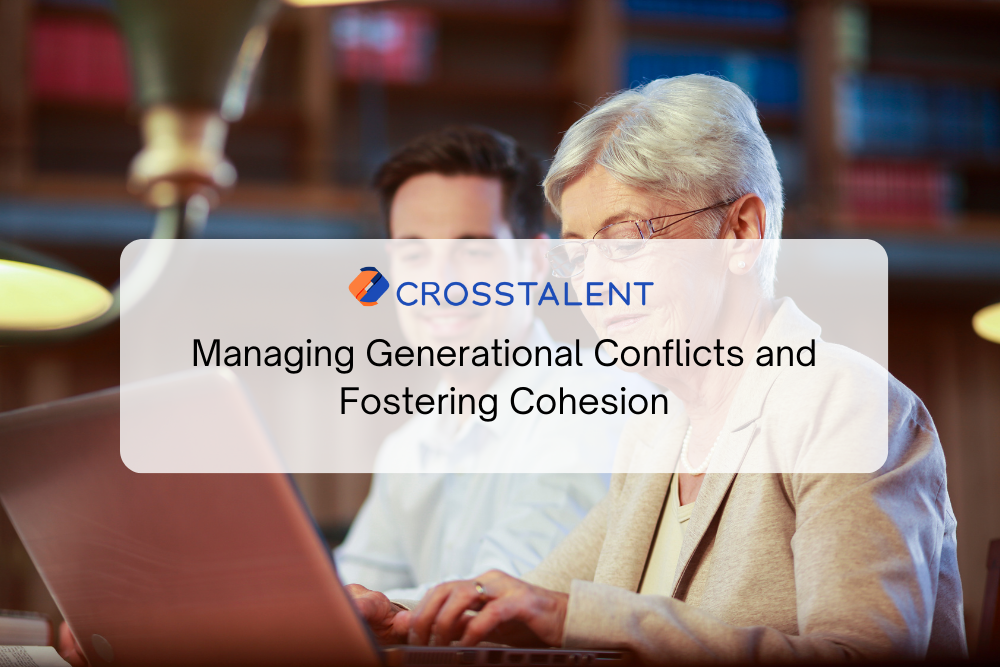Human resources (HR) have an essential role to play in helping to resolve these conflicts and promote intergenerational cohesion that benefits everyone. In this article, we’ll explore three ways in which HR can help resolve these conflicts and support harmonious collaboration between different generations within the company.
Understanding Intergenerational Conflict

Intergenerational conflict within a company can be caused by a number of factors.
Firstly, generational differences in values, perspectives, and expectations can create discord. Members of different generations may have divergent priorities and ways of working, which can generate tensions. Secondly, a lack of communication and mutual understanding can also contribute to intergenerational conflict. For example, age-based stereotypes and prejudices can lead to misunderstandings, discrimination, and feelings of marginalization within the team.
A recent study by JobTeaser highlights a characteristic specific to younger generations:
the Dunning-Kruger effect. This is a cognitive bias in which inexperienced people tend to overestimate their skills, which can lead to overconfidence. This effect is often perceived as arrogance by older generations. In the JobTeaser study, 73% of GenZ (Generation Z) are confident about their strengths and weaknesses in the job market.
Finally, technologies evolve rapidly and can create a gap between generations with different technological skills, which can lead to friction.
It is, therefore, crucial for a company to foster a culture of inclusion, promote generational diversity and facilitate open dialogue to reduce intergenerational conflict.
Is the Difference Really That Bad?
Yes, it is. Intergenerational conflicts within a company can be serious, with significant consequences for both the working climate and the organization’s overall performance.
First of all, these differences in perception and values can create tensions and a breakdown in communication within teams, which can hamper collaboration and mutual trust.
What’s more, these conflicts can also affect the motivation and commitment of employees, especially younger ones, who may feel devalued or ignored by older generations. This can lead to increased absenteeism, turnover, and lower productivity. Conversely, the older generations may also feel overwhelmed, leading to stress or, even worse, boredom or burnout.
Finally, inter-generational conflict can also hamper innovation and creativity within the company, as the ideas and perspectives of different generations are not sufficiently shared and exploited. According to a Deloitte survey in 2022, 63% of companies that encourage collaboration between different generations within their teams are more successful and innovative.
Therefore, companies must promote an inclusive environment and encourage intergenerational collaboration to prevent conflict and foster harmonious work dynamics.
How Can We Resolve Conflict Between Generations?

Raising Awareness and Understanding of Generational Differences
To resolve generational conflicts, it is essential for HR to raise awareness and understanding of generational differences. In the same way as cross-cultural training exists, HR can organize training and awareness sessions where employees from different generations can meet, share experiences and discuss the challenges they face. This will enable the generations to better understand each other, develop empathy and recognize each other’s value.
HR can also develop communication strategies tailored to each generation, encouraging open and constructive dialogue between team members.
Fostering a Culture of Inclusion and Intergenerational Collaboration
HR can also foster a culture of intergenerational inclusion and collaboration by implementing specific initiatives. For example, the creation of intergenerational workgroups encourages exchanges and cooperation between different generations. Each generation then feels respected and included.
HR can also encourage the creation of reverse mentoring programs, in which younger employees can contribute their technological expertise and innovative vision while older employees share their experience and wisdom acquired over the years.
By implementing non-discrimination policies and encouraging mutual respect between generations, HR contributes to the development of an inclusive working environment where generational conflicts are mitigated and collective skills are valued.
Implementing an Effective Conflict Management Policy
HR plays a crucial role in implementing an effective conflict management policy. It is, therefore, important to put in place a clear and transparent procedure for resolving disputes, favoring mediation or other alternative methods of conflict resolution.
HR can also provide employees with resources, such as, as we saw above, conflict management training, to help them resolve problems constructively.
In addition, HR should encourage regular feedback between different generations, enabling conflicts to be resolved at an early stage before they become devastating for the team and the company.
Other Avenues to Explore:
- Foster open and transparent communication: encourage different generations to exchange ideas and opinions. Hold team meetings to discuss potential problems or misunderstandings and find solutions together.
- Focus on the common goal: bring the different generations together around common goals and take on projects as a team. This will strengthen cooperation and bridge generational differences.
- Encourage flexibility: take into account the specific needs and expectations of each generation in terms of working conditions, working hours, modes of communication, etc. Try to find compromises that work for everyone. Try to find compromises that work for everyone.
- Invest in training and professional development: offer Learning and Development opportunities tailored to the needs of each generation. This will show your commitment to their development and reinforce their commitment to the company.
- Encourage a spirit of openness to change: help the different generations to understand and accept the changes taking place in the business environment. Show patience and empathy towards those who find it more difficult to adapt.
Conclusion
Managing generational conflict in the workplace is a growing challenge for HR.
By adopting a proactive approach and using the right workforce management tool, HR can help resolve these conflicts and create a harmonious, productive working atmosphere.
Raising awareness of generational differences, promoting a culture of inclusion and collaboration, and implementing an effective conflict management policy are all ways in which HR can facilitate the resolution of these conflicts.
By fostering intergenerational cohesion, HR contributes to building strong teams and ensuring the company’s long-term success.
The Different Generations Explained

Baby Boomers (born between 1946 and 1964)
They experienced a period of great economic prosperity after the Second World War. They are often associated with a hard-working mentality and tend to advocate stability and financial security. Baby Boomers experienced many societal upheavals, such as the civil rights movement and the first steps toward gender equality.
Generation X (born between 1965 and 1980)
Also known as the “baby-bust generation,” this generation has witnessed many technological changes, including the advent of the Internet. They are often considered independent and flexible, but have also experienced economic difficulties, such as the recession of the 1980s. Generation X has been very adept at adapting to new technologies, and was an early adopter of cell phones and personal computers.
Generation Y or Millennials (born between 1981 and 1996)
This generation has been profoundly influenced by the rise of digital technology and the Internet. They are seen as more diverse and tolerant and tend to value work-life balance. Millennials have also experienced economic hardship, such as the 2008 global financial crisis, and were early adopters of social media and smartphones.
Generation Z (born between 1997 and 2012)
Also known as the digital generation, Generation Z grew up with the Internet and social networks already well established. This generation is often described as multitasking and technologically savvy. They are also aware of social and environmental issues and are often considered more open-minded and inclusive than previous generations.
The Alpha generation (born in 2013)
This generation is still very young, and little information is available to date. However, certain distinctive traits are beginning to emerge, such as an almost innate familiarity with technology, great diversity, and an increasingly connected world from an early age.
These categories are general and do not take into account the different individual experiences that can vary considerably within each generation.




